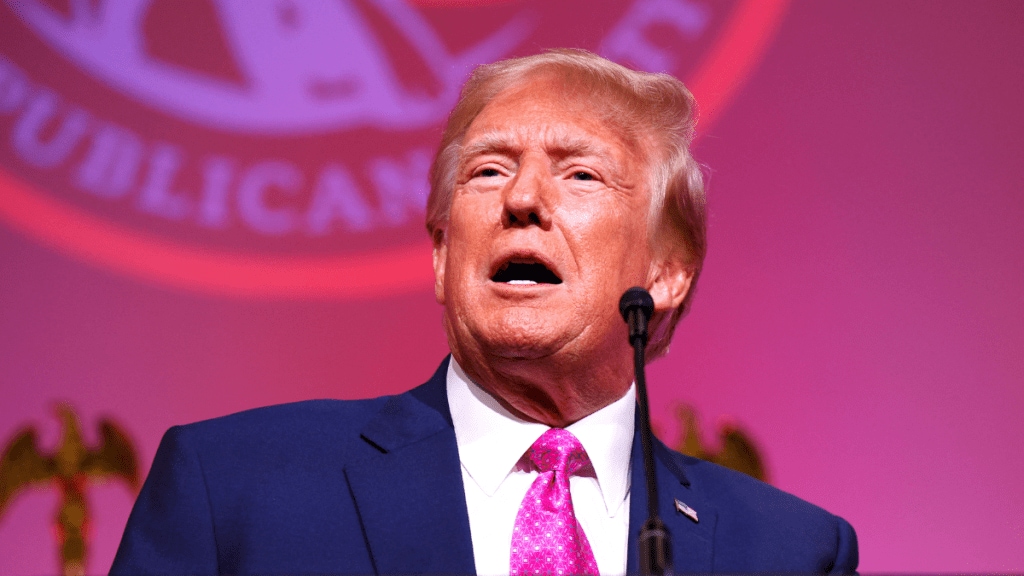US President Donald Trump on Sunday announced that he will impose a 25 per cent tariff on all steel and aluminium imports, with details expected on Monday. Speaking to reporters aboard Air Force One on Sunday, Trump confirmed that the new tariffs would apply to all countries but did not specify when they would take effect, reports news agency Bloomberg.
The tariff announcement comes just before Prime Minister Narendra Modi’s scheduled visit to the United States on February 12, adding a layer of complexity to trade discussions between the two nations.
The president also stated that he would unveil reciprocal tariffs on nations that impose taxes on US imports later in the week. These additional tariffs are expected to follow shortly after their announcement, potentially by midweek.
Impact of Reciprocal Tariffs
This latest move is part of Trump’s broader trade strategy, which has already included a 10 per cent tariff on Chinese goods. In response, Beijing has announced $14 billion in retaliatory measures set to take effect on February 10. Market watchers are now looking to see if the US and China can negotiate a resolution before the new Chinese levies take hold. The White House has hinted at an upcoming call between Trump and Chinese President Xi Jinping.
The full implications of reciprocal tariffs remain uncertain, as each country follows distinct import policies and must often adhere to economic agreements like those within the European Union. These tariffs could significantly impact key US trading partners, including Canada, Mexico, China, the EU, and Japan.
While President Donald Trump has frequently portrayed tariffs as financial penalties imposed on other nations, the reality is that these duties are paid by US importers—companies bringing foreign goods into the country. These businesses typically transfer the additional costs to consumers by increasing prices. According to the US Census Bureau, Canada was the top supplier of imported steel to the US last year, followed by Brazil, Mexico, and South Korea.
Tariff impact on Indian economy
Trump’s recent tariff announcement comes at a challenging time for Indian steel manufacturers, who are facing significant hurdles in global markets. This has led to a steep drop in exports and a substantial increase in steel imports into India. In the previous financial year, steel imports rose by nearly 41%, while exports saw a sharp 36% decline, highlighting the industry’s ongoing struggles to maintain international competitiveness.
As a result, Indian exports to the US may become less competitive due to higher costs for American buyers. This could lead to reduced demand and declining export revenues for Indian manufacturers. Additionally, India’s domestic market may face increased pressure as surplus steel, originally meant for the US, will flood local markets, potentially lowering prices and affecting profitability. The move could also disrupt global supply chains, impacting sectors like automotive, construction, and manufacturing in India.
India exports steel to the US in the form of stainless steel wire, flat-rolled stainless steel products, and semi-finished iron and non-alloy steel products.
The new tariffs are likely to have a significant impact on the US economy also, particularly the energy sector. Oil companies that rely on speciality steel grades—many of which are not produced domestically—may face higher costs. Some firms received exemptions from similar tariffs during Trump’s first term, though it remains unclear if exclusions will be granted again.
Many buyers and sellers of steel and aluminium had anticipated having until March to prepare for the tariff rollout. However, Trump’s previous delay on tariffs set for February 1, following border security discussions with Mexico and Canada, raises questions about potential exemptions for these key trading partners.
US Steel Industry
Trump’s steel tariffs come at a time when the domestic steel industry is attempting to recover from a challenging period. US steelmakers have raised concerns about increased imports affecting profitability and production.
The announcement also coincides with Japan’s Nippon Steel Corp.’s stalled $14.1 billion bid to acquire US Steel Corp. The deal was blocked by the Biden administration and faces opposition from Trump as well. Trump has suggested that Nippon Steel invest in US Steel instead of acquiring a controlling stake. The companies are now challenging the US block in court.

